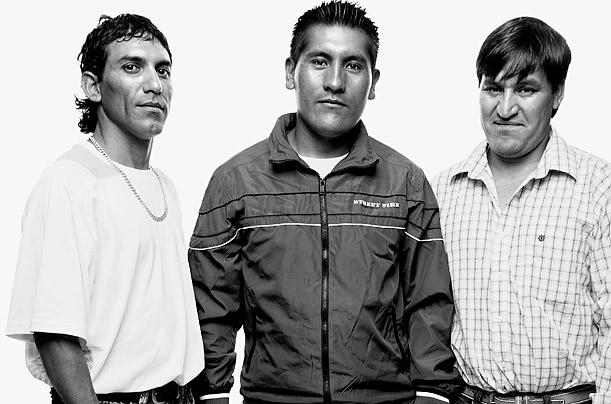
Chilean miners (l to R) Claudio Yañaez, Carlos Mamani, Osman Avaya
(2 of 3)
Q&A with Chilean Miner Luis Urzúa
Luis Urzúa was the foreman of the 33 Chilean miners — Los 33 — trapped 2,300 feet below the Atacama Desert for 70 days before they were finally rescued in October. Urzúa's avuncular leadership helped his men survive the first 17 awful days after the collapse of the San Jose gold and copper mine in northern Chile, keeping them united, active and in good spirits while stretching two days' worth of food more than two weeks until officials finally located them. Urzúa, 54, a mining veteran and self-taught geology expert, spoke briefly with TIME's Tim Padgett and Aaron Nelsen in Santiago:
TIME: What did you learn from this drama to be the most important ingredient of successful leadership?
Urzúa: Preparation. All the geology study I did, all the courses I took on mines, including [the San Jose mine], and all the security procedure reviews — you keep asking yourself, Why are we doing all this? And then one day you see all of this — the hardship we endured but also all the celebration we're enjoying now.
TIME: What moment most sorely tested your leadership skills down there?
Urzúa: I'd have to say the moment, strangely enough, when we first felt hope. After quite a few days we could suddenly hear the drills probing for our whereabouts; we could hear them just meters above our heads. And then just as suddenly they went silent and disappeared. That was probably the worst moment of despair for everybody: it was easy to think then that this was it, this was far as those drills, and we, were going to go.
TIME: What could you do?
Urzúa: Even though I realized that locating us was like finding a needle in a haystack, I never gave up hope that help would arrive. It's then that you have to convince [the men] not only that they're going to survive, but why they have to survive — their families, their faith.
TIME: The miners themselves have applauded you for your democratic approach to rules and organization below ground.
Urzúa: We were 33 people with distinct characters, but we made sure it was one for all and all for one down there. I feel my best decision as the foreman was to insist that everyone participate in the decision process — the 16-plus-one majority held sway — about everything from each man's tasks to how much we'd eat and drink each day and where. Keeping order and structure was very important. You have to understand, when the mine collapsed it was chaos — like one of those snow avalanches you see in the movies. There was so much dust it took more than a day just to see in front of ourselves.
TIME: When you were found and it was time to plan the rescue, you were the leader below and President Piñera was the leader above. You're from a poor mining family, the President is a billionaire. Was communication difficult?
Urzúa: It wasn't as difficult as some might think. In fact, our differences may have made our communication that much stronger, as we learned about each other. I remember on one phone call hookup between [the miners' emergency shelter] and his office here in Santiago, we must have talked for half an hour. The important thing was that neither of us ever doubted, even before los 33 were found, that we'd all survive this thing.
TIME: You also told him, "Please don't ever let this happen again."
Urzúa: I owed it to every miner everywhere to say that. And I'm glad to see the President is demanding [mining] reforms now.
TIME: Some of you just returned from China, where people welcomed you as heroes, as they have everywhere you go. Have you been surprised by the worldwide outpouring for you and the miners?
Urzúa: Not surprised but a little amazed, especially at the quantity of people around the world who supported us — and at the faith the whole world had in us. This was about faith in the end.